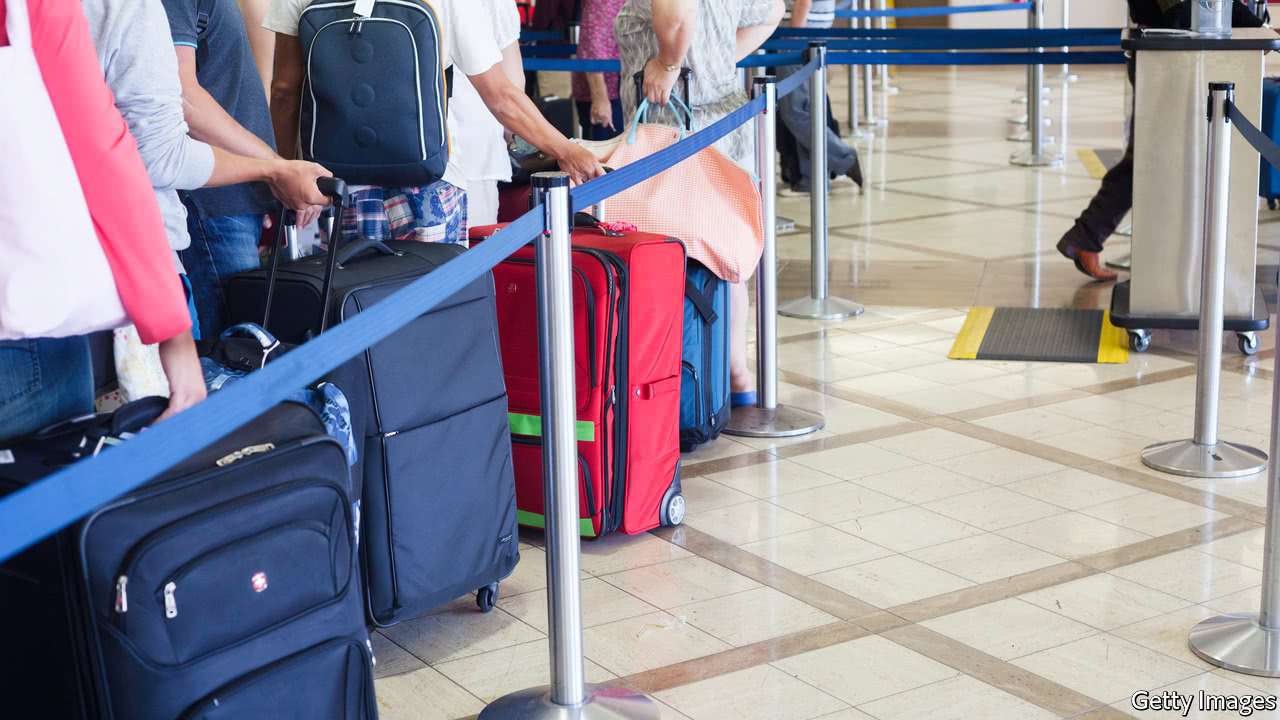
FEES for checked luggage are working exactly as intended. That is the main thrust of a new report from America’s Government Accountability Office (GAO) on the recent rise of charges for checking a bag onto a plane when flying. But not everyone is interpreting the study in such a positive light.
Critics are crying foul because these fees cost some passengers more money. Bill Nelson, a Democratic senator who requested the study and sits on the committee that oversees the airline industry, has described the charges as a “last-minute shakedown”. William McGee of Consumer Reports, a non-profit organisation that reviews products, told USA Today that “consumers should be able to shop for airline seats without being nickel-and-dimed.”
-
How bike-sharing works
-
Monarch Airlines goes into administration
-
China is turning against cryptocurrencies
-
The Tory conference reflects the dismal state of the party
-
At least 59 people are killed and 527 injured in a shooting in Las Vegas
-
A Nobel prize for medicine for the understanding of body clocks
Media outlets are also making the same point. When the Associated Press reported on the study, it noted that “travelers who check at least one bag when flying domestically are paying more overall to fly than they did before airlines began unbundling fares in 2008.” TravelMole, a travel-news site, echoed these sentiments.
The critics are, of course, correct. As the GAO makes clear in the report:
“Customers who paid for checked bags paid more on average for the combined airfare and bag fee than when the airfare and bag fee were bundled together. Conversely, passengers who did not check bags paid less overall.”
But that is precisely the point of unbundling. Those with checked bags have to pay slightly more and those without luggage have to pay slightly less. This is not like the introduction of basic-economy fares, when airlines kept the lowest-cost fares the same and charged extra for the privilege of carrying on a bag or pre-selecting seats. As long as airlines are transparent and display checked-baggage fees clearly, unbundling works as intended.
However, checked-baggage fees do create some unfortunate incentives. Some travellers go to highly unpleasant lengths to save that $50, as anyone who has stuffed shoes into their pockets and thrown on extra layers in a check-in queue will attest. (Gulliver himself would know nothing about such things, of course.) And when security lines grew at American airports in the spring and summer, lawmakers fretted that checked-luggage fees were exacerbating the problem by making flyers carry on more bags.
Moreover, the payouts from such levies makes it easy to demonise airlines. The GAO report noted that American airlines made $7bn in baggage and cancellation fees last year. A separate study from IdeaWorksCompany, a research group, found that in 2016 the world’s biggest carriers made an eye-popping $45bn from passenger fees, such as baggage charges and in-flight entertainment, and commissions for shepherding passengers to hotels and car-rental companies. Such lucrative revenue streams also makes it hard for airlines to oppose charges airports wish to impose. This is a hypocrisy that airport executives have been quick to point out.
But in the case of checked-baggage fees, Gulliver finds himself in rare agreement with Airlines for America, a trade group. It warns against government action to undo the charges, saying in a press release that “our passengers are more than able to navigate the wide menu of choices that airlines offer without interference from Washington.”
Source: economist
Concerns over charges for checked bags in America miss the point